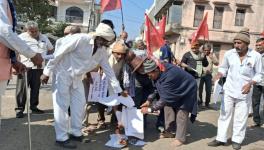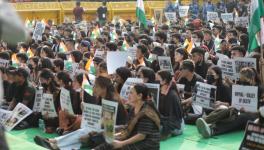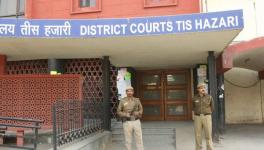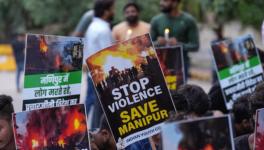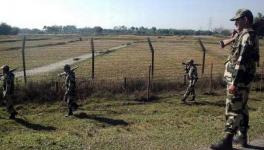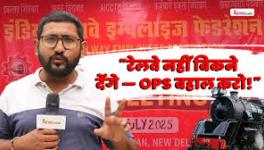Farm Laws: Delhi Police Registered 38 Cases in Connection with January 26 Violence, Lok Sabha Told
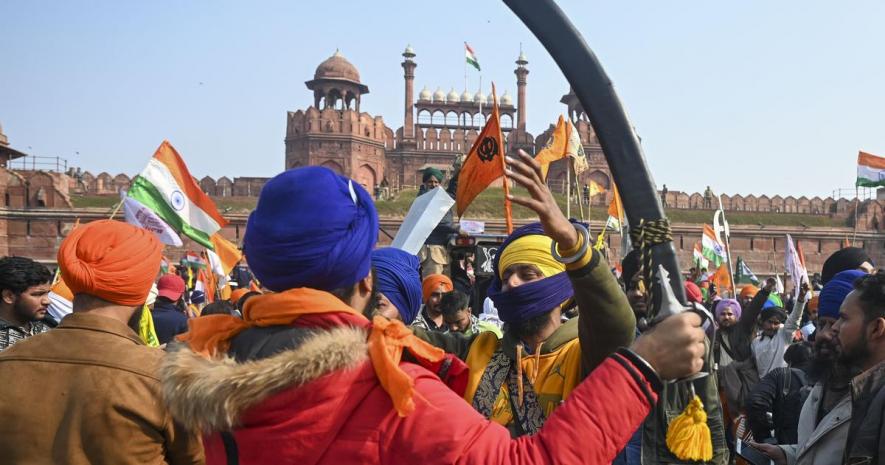
Image Courtesy: AFP
The Delhi Police has registered 38 cases against people, including foreigners, following incidents of violence on January 26 in the capital during the farmers’ protests against the Farm Laws, Union Minister of State for Home G. Kishan Reddy said on Wednesday.
“The Delhi Police has informed that 38 cases have been registered against the persons, including foreigners, who violated various legal provisions, including cyber crime, recently in Delhi, while protesting in the name of farm laws (sic),” Reddy said in reply to a written question. He added that the capital’s police force had informed that no road had been dug up at the city’s borders in view of the agitation but that security was strengthened, the minister said in the Lok Sabha.
Farmers from across the country have been camped outside Delhi since November 26 last year protesting against the three contentious laws they have called “anti-farmer.” Days prior to their march to Delhi the All India Kisan Sangharsh Coordination Committee (AIKSCC) had said that 31 leaders from farmers groups and trade unions had been arrested or detained in Haryana. The farmers’ body attacked the government for its “attempts to use the excuse of COVID-19 to thwart the democratic right of citizens to protest against anti-people moves.”
As they moved to Delhi at the end of November last year farmers from Punjab and Haryana faced lathi-charge, water cannons and tear gas. Farmers from Uttar Pradesh were also met with police repression at the Ghazipur Border at the time.
On Republic Day, exactly two months later, the farmers’, who were then engaged in rounds of talks with the BJP-led Central Government had planned a tractor rally, the route for which was agreed upon after talks with the Delhi Police. Even ahead of the rally farmers were allegedly being put under house arrest in UP, issued notices and petrol pumps were asked to not supply them with diesel for their tractors.
The minister told the Lower House of Parliament this morning that the Delhi Police informed that the Samyukt Kisan Morcha broke barricades on Republic Day in violation of the permission granted for taking out a tractor parade on a mutually accepted route. He said the protesters proceeded towards Central Delhi despite being stopped at other barricades inside the city and broke those barricades as well.
The minister said that given the incidents and the manner in which protesting farmers used tractors as “weapons” for breaking the barricades and injuring policemen, the barricades at the Delhi-Uttar Pradesh border were strengthened to prevent any possible repeat of the conduct displayed on January 26.
However, on January 27, the day after the tractor rally, the farmers had said that the Centre was “severely shaken by this peasant agitation. Therefore, a dirty conspiracy was hatched with Kisan Mazdoor Sangharsh Committee and others against the peaceful struggle of other farmer organisations.”
Regarding the charge that the farmers had deviated from the route agreed upon, BKU leader Rakesh Tikait had said back then that the “designated route was barricaded to provoke the farmers. The government, which wanted to disrupt the peaceful protest, planted its people to create trouble.”
A total of ten journalists including Rajdeep Sardesai, Vinod K. Jose, Mrinal Pande, Zafar Agha, Anath Nath and Paresh Nath were slapped with FIRs for allegedly sharing misleading information on Twitter regarding the death of a protester during the tractor rally.
While the Delhi Police said that Navreet Singh had died due to a head injury after his tractor overturned, doctors and forensic experts had said the injuries he sustained were possible due to a bullet injury. On March 4 the Delhi High Court asked the UP Police to share the original X-ray plate and forensic report with the Delhi Police.
In order to alleviate the hardships caused to the commuting public due to the activities of the protesters, adequate deployment of police personnel is made for providing alternative routes to the general public, ensuring law and order and for ensuring smooth movement of traffic at borders, the minister said.
In early February the farmers’ protest sites presented a shocking picture of the government’s hostility towards farmers. The police had put up multiple layers of barricades of reinforced concrete, topped by razor wire, roads festooned with iron rods and spikes, empty containers blocking main carriageways while concrete blocks cap small lanes that open on the roads. Movement was tightly restricted, traffic diverted and farmers were deprived of sanitation, toilets, even net connectivity.
Since the events of January 26 the Union Government has refrained from engaging in talks with the farmers even as mahapanchayats have been attended by farmers in the thousands.
With PTI inputs
Get the latest reports & analysis with people's perspective on Protests, movements & deep analytical videos, discussions of the current affairs in your Telegram app. Subscribe to NewsClick's Telegram channel & get Real-Time updates on stories, as they get published on our website.










